|
|
|
Sort Order |
|
|
|
Items / Page
|
|
|
|
|
|
|
| Srl | Item |
| 1 |
ID:
183442
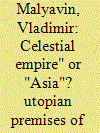

|
|
|
|
|
| Summary/Abstract |
This article deals with the philosophical foundations and historical consequences of two influential political concepts in the Far East: New Celestial Empire and Asia as Method. The author shows that politics in the Far East have been traditionally based on the categories of the Void and Transformation, which gave rise to a specific type of Utopian consciousness with its motif of universal co-being within the encompassing yet singular event. The New Celestial Empire concept reflects global aspirations of the PRC, taking into consideration local specifics. The concept of Asia as Method aims at decolonization and deimperialization in the Commonwealth of Independent States (CIS) and is popular in Japan, South Korea, Taiwan, and Hong Kong. The author examines the confrontation between these theories and suggests ways for their possible integration.
|
|
|
|
|
|
|
|
|
|
|
|
|
|
|
|
| 2 |
ID:
160019
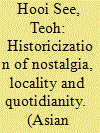

|
|
|
|
|
| Summary/Abstract |
This article seeks to shed light on Lim Kim Chern’s gastronomic writing, by ensconcing this individual case in the context of Modern Chinese Prose as an enduring literary tradition, in order to elicit the attribute of locality with diasporic discourse in quotidian life, that distinguishes it as part of a work in Malaysian Chinese Literature than the others. We will further this quest, by comparing the gastronomic writing of Lim before and after the changes in his literary pursuit in gastronomic writing, namely, by the comparison of the literary hierarchy of high-brow literature and the sub-genre of literature that post-positions the literariness, in order to examine whether or not it is a revelation, or even a harbinger of the fate of Malaysian Chinese Literature being minor literature.
|
|
|
|
|
|
|
|
|
|
|
|
|
|
|
|
| 3 |
ID:
076456


|
|
|
| 4 |
ID:
096980
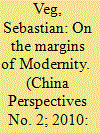

|
|
|
| 5 |
ID:
169266


|
|
|
|
|
| Summary/Abstract |
The study focuses on the institution of boarding schools (Russian: internat) in Soviet Tajikistan in the 1950s and 1960s and its role in the education and training of the new national generations of skilled professionals in the fields of industry, science, culture, art and healthcare, which in turn contributed to the development of their country. Along with the de-Stalinization of education and subsequent polytechnization, as well as flexibility in the use of Soviet institutions, the internats were transformed from a purely Soviet project into a more inclusive Soviet-Tajik project at the national level for the training of new young national-Sovietized professionals. These professionals combined the qualities of Sovietized and local (national), with their distinctive norms, traditions and values, into a totally new form. The boarding school system turned into a factory for bringing up national-Sovietized specialists and cadres.
|
|
|
|
|
|
|
|
|
|
|
|
|
|
|
|
| 6 |
ID:
096044


|
|
|
|
|
| Publication |
2010.
|
| Summary/Abstract |
This article is an attempt to understand 'locality', where the issues of subversion, subordination and marginalization as well as the problematic notions of liminality and empowerment are more vibrant and real. We shall demonstrate that while the low castes and untouchables were engaged in economic conflict, at various levels, with the high-caste landowners, which resulted in occasional uprisings too, the popular belief system was used by the marginalized as an instrument of assertion of their power against social coercion. It is argued that the social and ritual protest aimed at diluting or subverting the local caste hierarchy in a stratified society is an efficacious threat to the power of the high castes; that the hope of social revision becomes an alternative to economic subordination. More important, the symbols of empowerment are not the ones controlled by the high castes, but those which are located in the specialized rituals of the marginalized dalits. This article is about these symbols, which are liminal in nature, and how they empower, if only for a brief while, the economically exploited and socially marginalized dalit practitioners.
|
|
|
|
|
|
|
|
|
|
|
|
|
|
|
|
| 7 |
ID:
120216


|
|
|
|
|
| Publication |
2013.
|
| Summary/Abstract |
This article examines how the politics of scale affect a process of dialogue led by civil society actors over fishing conflicts taking place at the local level in South Asia. The location is the Palk Bay and the fishers are Tamils from India and Sri Lanka. An agreement over fishing rights reached between these fishers in August 2010 remains largely unimplemented, but takes centre stage for this article, which examines the negotiation processes in terms of politics of scale and highlights the various difficulties encountered. Major pitfalls in a dialogue of this sort are the failure to recognise diversity within the population(s) involved and lack of recognition of the linkages of this population with other actors at different scales or levels. In a transboundary context, national and regional identities at times override local identity and interests, thereby making locally constructed solutions difficult, if not impossible, to implement.
|
|
|
|
|
|
|
|
|
|
|
|
|
|
|
|
| 8 |
ID:
112740
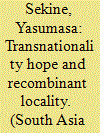

|
|
|
|
|
| Publication |
2012.
|
| Summary/Abstract |
This article searches for sustainable methods of handling the stresses of globalising existence and contrasts two strategies of using knowledge as a form of capital or resource in different forms of 'packaging from above' and 'packaging from below'. Taking the examples of appropriation of Vastuvidya in Europe and of Hindu worship of the Hawaiian Healing Stones, it is argued that such methods of re-packaging and the concept of 'recombinant locality' are strategically useful tools and devices to understand better how people may preserve glocalised spaces while opposing uniformising globalisation and capitalist domination. The article suggests that, in this way, structurally disadvantaged but hopeful and enterprising transnational individuals and groups may empower themselves to improve their 'lifeworld' in diaspora.
|
|
|
|
|
|
|
|
|
|
|
|
|
|
|
|
| 9 |
ID:
092249
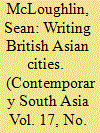

|
|
|
|
|
| Publication |
2009.
|
| Summary/Abstract |
This article reports in brief on an Arts and Humanities Research Council (AHRC) Diasporas, Migrations and Identities (DMI) programme funded network, 'Writing British-Asian Cities', which ran between 2006 and 2009. It contends that the diverse local configuration of Asian Britain has to a large extent remained unexamined in the literature. Having organised community-based events in five English cities, an indication is given of how London's East End, Bradford, Manchester, Birmingham and Leicester have all been 'written' and represented across a variety of genres since the 1960s. Bringing the perspectives of the social sciences into conversation with the arts and humanities, the network also prioritised further reflection on certain disciplinary perspectives and cross-cutting themes: history; literary/cultural production; religion; gender. Various working papers and other resources which report in more detail on the project are lodged on an interactive website, while a research group of the British Association of South Asian Studies (BASAS) has also been recently established.
|
|
|
|
|
|
|
|
|
|
|
|
|
|
|
|
|
|
|
|
|